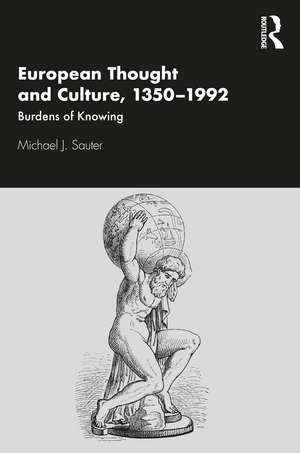European Thought and Culture, 1350-1992: Burdens of Knowing
Autor Michael J. Sauteren Limba Engleză Paperback – 7 iun 2021
The book reads the period against spatial thought’s history (spatial sciences such as geography or Euclidean geometry) to argue that Europe cannot be understood as a continent in intellectual terms or its history organized with respect to traditional spatial-geographic categories. Instead we need to understand European intellectual history in terms of a culture that defined its own place, as opposed to a place that produced a given culture.
It then builds on this idea to argue that Europe’s overweening drive to know more about humanity and the cosmos continually breached the boundaries set by venerable religious and philosophical traditions. In this respect, spatial thought foregrounded the human at the unchanging’s expense, with European thought slowly becoming unmoored, as it doggedly produced knowledge at wisdom’s expense. Michael J. Sauter illustrates this by pursuing historical themes across different chapters, including European thought’s exit from the medieval period, the Renaissance, the Reformation, the Scientific Revolution, the Enlightenment and Romanticism, the Industrial Revolution, and war and culture, offering a thorough overview of European thought during this period. The book concludes by explaining how contemporary culture has forgotten what early modern thinkers such as Michel de Montaigne still knew, namely, that too little skepticism toward one’s own certainties makes one a danger to others.
Offering a comprehensive introduction to European thought that stretches from the late fourteenth to the late twentieth century, this is the perfect one-volume study for students of European intellectual history.
| Toate formatele și edițiile | Preț | Express |
|---|---|---|
| Paperback (1) | 366.67 lei 6-8 săpt. | |
| Taylor & Francis – 7 iun 2021 | 366.67 lei 6-8 săpt. | |
| Hardback (1) | 1013.21 lei 6-8 săpt. | |
| Taylor & Francis – 7 iun 2021 | 1013.21 lei 6-8 săpt. |
Preț: 366.67 lei
Nou
Puncte Express: 550
Preț estimativ în valută:
70.17€ • 73.17$ • 58.32£
70.17€ • 73.17$ • 58.32£
Carte tipărită la comandă
Livrare economică 21 martie-04 aprilie
Preluare comenzi: 021 569.72.76
Specificații
ISBN-13: 9780367902896
ISBN-10: 0367902893
Pagini: 498
Dimensiuni: 156 x 234 x 26 mm
Greutate: 0.69 kg
Ediția:1
Editura: Taylor & Francis
Colecția Routledge
Locul publicării:Oxford, United Kingdom
ISBN-10: 0367902893
Pagini: 498
Dimensiuni: 156 x 234 x 26 mm
Greutate: 0.69 kg
Ediția:1
Editura: Taylor & Francis
Colecția Routledge
Locul publicării:Oxford, United Kingdom
Public țintă
Undergraduate AdvancedCuprins
Introduction: Nosce Te Ipsum 1. Imagining Europe 2. Ancient thought and the medieval synthesis I 3. Ancient thought and the medieval Synthesis II 4. Borrowed syntheses—medieval Muslim and Jewish thought 5. Post-medieval syntheses 6. The spatial reformation 7. Humanism and the Southern Renaissance 8. Humanism and the Northern Renaissance 9. The Protestant revolution 10. Tolerance and the culture of doubt 11. Law, God, and magic 12. A new certainty 13. The Scientific Revolution I 14. The Scientific Revolution II 15. Jesuits, Jansenists, and other heretics 16. Science as religion 17. From nature to state 18. Platos many and varied 19. A world of numbers 20. The invention of history 21. The power of reason 22. Progressive intolerance 23. The production of isms 24. The Industrial Revolution and its discontents 25. Space and race 26. From urbanization to urbanity 27. Novels, writers, and readers 28. Sex, gender, and the critical mind 29. Prophecy from the margins 30. Situating the social 31. The new social science 32. The First World War and European culture 33. The science of rootlessness 34. The vacuum of knowledge 35. From the ashes Conclusion: good-bye to all that
Notă biografică
Michael J. Sauter is a professor of history at the Centro de Investigación y Docencia Económicas (CIDE) in Mexico City. He is the author of Visions of the Enlightenment: the Edict on Religion of 1788 and the Politics of the Public Sphere in Eighteenth-Century Prussia (2009) and The Spatial Reformation: Euclid Between Man, Cosmos and God (2018).
Descriere
This book explores the main currents of European thought between 1350 and 1992, which it approaches in two main ways; culture as produced by place and the progressive unmooring of thought from previously set religious and philosophical boundaries.
